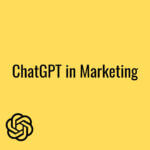My example dialogues and use cases show the amazing opportunities for marketers from ChatGPT and other generative AI tools
I’ve been advising on digital marketing and new innovations for over 25 years. Since it was called Internet Marketing… This tends to make you super cynical as to new claims about marketing innovations. Over this time, many of the techniques for digital marketing and approaches to planning digital marketing strategies and campaigns have remained similar.
Much Martech now promises to be be ‘AI-powered’ while still relying on manual analysis and customizations. In fact, I’d say that it’s the development of search and social media platforms that have been the main drivers of change. Until now, that is...
Having tested ChatGPT, I believe it will spark mainstream adoption of AI amongst marketers, since it will be used as a practical tool to support creative development to help marketers working on search, email and social media marketing.
I won’t explain the technology behind ChatGPT, if you’re looking for an introduction applied to digital marketing, I recommend this overview of ChatGPT from Search Engine Journal. In essence, it is a free (for now) conversational SaaS AI chatbot that understands the intent of complex, specific questions and potentially produces human-quality responses.
You'll see from my examples that you type in a question and it responds with an answer, remembering the context from previous questions. For more channel specific marketing tips, you can read more about my top 8 recommended prompts for using ChatGPT for digital marketing.
Latest ChatGPT developments for marketing
Since I originally wrote this article on Using ChatGPT for marketing just after it launched, there has been a whirlwind of developments from OpenAI and their partners. For marketers who are busy with their day job, this can be bewildering and you can miss some of the key developments, so I have summarized some of the main developments in a brief timeline of the latest ChatGPT developments . These include:
- 1 ChatGPT features integrated into Microsoft Bing (now Co-Pilot)
- 2 New Open AI business services and upgrades including GPT–4, Plugins for ChatGPT, ChatGPT Plus
- 3 The AutoGPT agent
- 4 Privacy limitations of ChatGPT
- 5 Launch of Gemini (formerly Bard) by Google
- 6 Increased usage of other AI writing tools for marketing
- 7 Increased use of OpenAI text-to-image tools (DALL-E) and text-to-video tools (Sora)
Members can read about other ‘need-to-know’ key digital marketing developments in our regularly updated latest Digital Media updates tracker.
How many marketers are using ChatGPT?
Our recent LinkedIn survey found that more than three-quarters of marketers want to use ChatGPT to improve their marketing performance, but only 40% are actively doing so right now.
Sometimes, it can be difficult to know where to start. That's why we've created a Quick Win for Smart Insights Business Members to rapidly review and assess new ChatGPT opportunities: How to use ChatGPT for marketing.
This guide is for anyone looking to learn more about ChatGPT, but would be particularly useful for marketers executing or managing channel specialisms. E.g., Content marketers, social media marketers, SEO specialists or strategists, etc. to learn how you could use the AI chatbot collaboratively to improve efficiency in your team, in less than 20 minutes.
Access our Quick Win – How to use ChatGPT for marketing
Discover everything you need to know about advanced prompting techniques for ChatGPT in our Quick Win.
Access the How to use ChatGPT for marketing
If you're a content marketer or SEO specialist or strategist, we also have a Quick Win with specific details about using AI for SEO with ChatGPT.
How widely is generative AI and ChatGPT used in marketing?
ChatGPT has been widely adopted by marketers, mainly for writing copy based on prompts provided by the user. Our Future of Digital Marketing report 2024 shows that many businesses are actively using Generative AI for copywriting, using large language models such as GPT for writing copy for different channels. The results are sorted below based on the applications with the highest percentage who are using them.
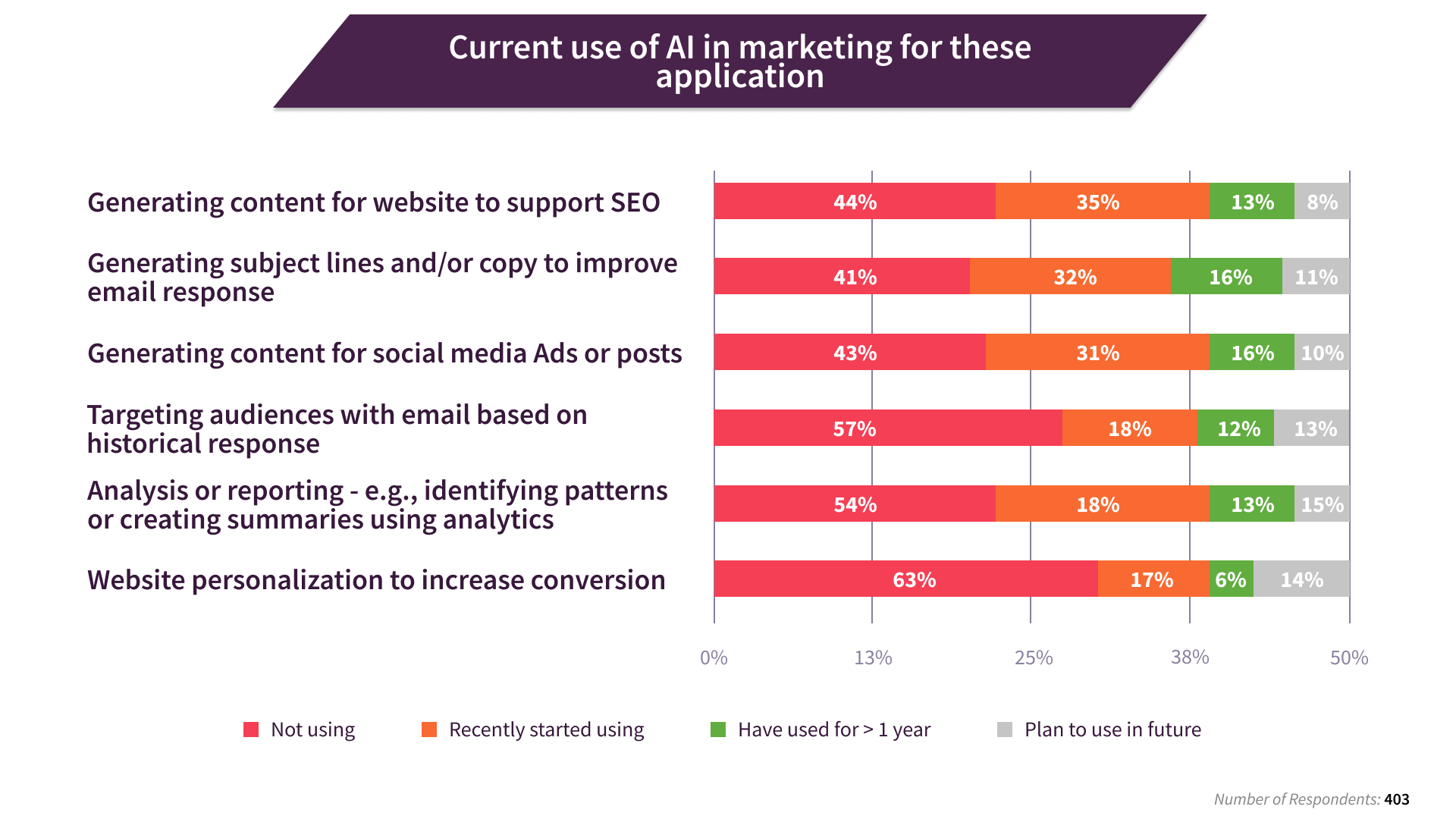
To support our premium members, I have created several different guides with detailed examples of using ChatGPT prompting techniques for email, social media and organic search to better customize marketing copy to a specific audience for a business and their goals. I have also created our popular ChatGPT prompt sheet for marketers as a free download, highlighting some of the prompting skills that 'hands-on' marketers need to know about.
What about using Gen AI for planning?
In the survey, we didn't ask about using GenAI tools to support planning. But we will in the next survey, since a recent LinkedIn poll I ran about asking whether peoople were using AI for planning suggests that many marketers are using AI to support creation of marketing plans already. I was really surprised that the MAJORITY of people doing the poll were using Generative AI for planning. As I'll get into, there are certainly BIG limitations of using AI for marketing planning without intervention, but as a collaborative tool to improve your marketing plans and generate them more efficiently I think it's an exciting development.
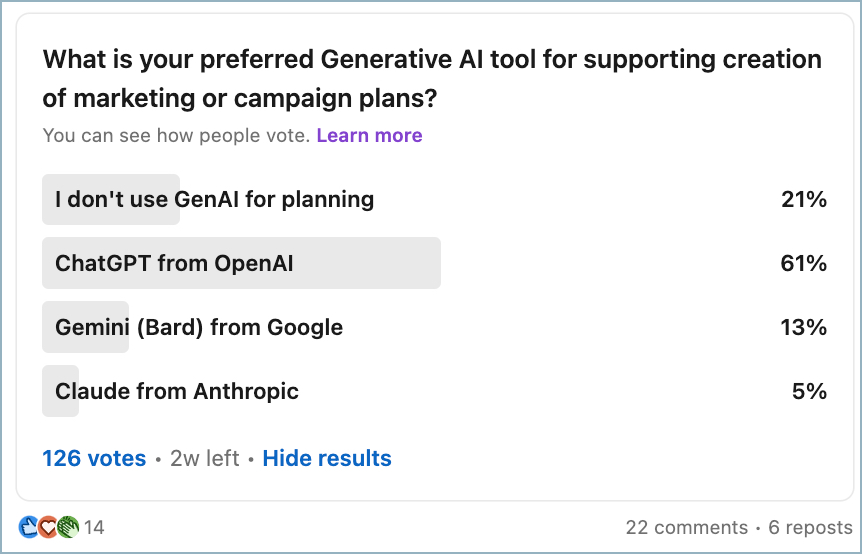
How can Generative AI tools support marketing planning?
Some consider AI tools will replace marketers, but we see current tools more as collaborative tools. This is true both for copywriting and planning. They can help support the modern 'AI-assisted marketer' who has many tasks to complete by making them more efficient.
There are some obvious benefits of using Generative AI to support marketing planning which help explain why it is as popular as it is:
- Time saved in creating initial structure of plan
- Summarizing the key points from insight which informs the plan
- Suggestions of strategic approaches that the plan author may not be familiar with
- Recommending the types of goals and measures that are needed to control plans
Despite these, there are many more disadvantages of using AI for planning which mean that great caution is needed in trusting plans from AI. Read more in my article on using ChatGPT and Generative AI for writing digital marketing plans and strategies.
Disadvantages of using AI for marketing planning
Before we look at specific problems of using AI for creating each part of a strategy, it's worth remembering that many alternative approaches to creating and structuring plans have evolved.
If an AI is asked to create a plan, it will often almagamate the many alternative approaches for creating a strategy from their training data set, so there isn't a clear logical structure based on a process of situation review, objective setting, strategy, tactics and implementation.
here's 10 reasons why you shouldn't solely rely on AI alone for marketing planning:
1. AI doesn't fully understand your audience and market as experienced people do
2. AI can't yet review business performance through analytics to identify opportunities
3. AI can't set realistic SMART objectives
4. AI can't prioritize strategic initiatives
5. AI can't select from segmentation, targeting and positioning alternatives
6. AI has limited creativity and originated - these are essential to brand differentation
7. AI won't be aware of cultural or in-company sensitivities about strategies. They won't know about previous strategies and which were effective or not.
8. AI can't readily integrate business, marketing and digital strategies so they are aligned
9. AI can't prioritize tasks for strategy 90-day plans, for example across the 70 SOPs within the RACE framework
10. AI doesn't have the intelligence t perform performance reviews to diagnose problems and suggest practical solutions.
There are many potential applications for AI in marketing, but it hasn't previously delivered on its promise
Following the November 30th 2022 launch of Chat GPT from Open AI and the hype that has followed since, my cynical filter was set to maximum. After all, at Smart Insights, we’ve been writing about the uses of AI in marketing for years - see our 2017 summary for how AI can support marketing from Rob Allen and I where we summarized these applications of AI across the customer lifecycle. ChatGPT is in the chatbot category supporting the Convert/Engage part of the RACE customer lifecycle.
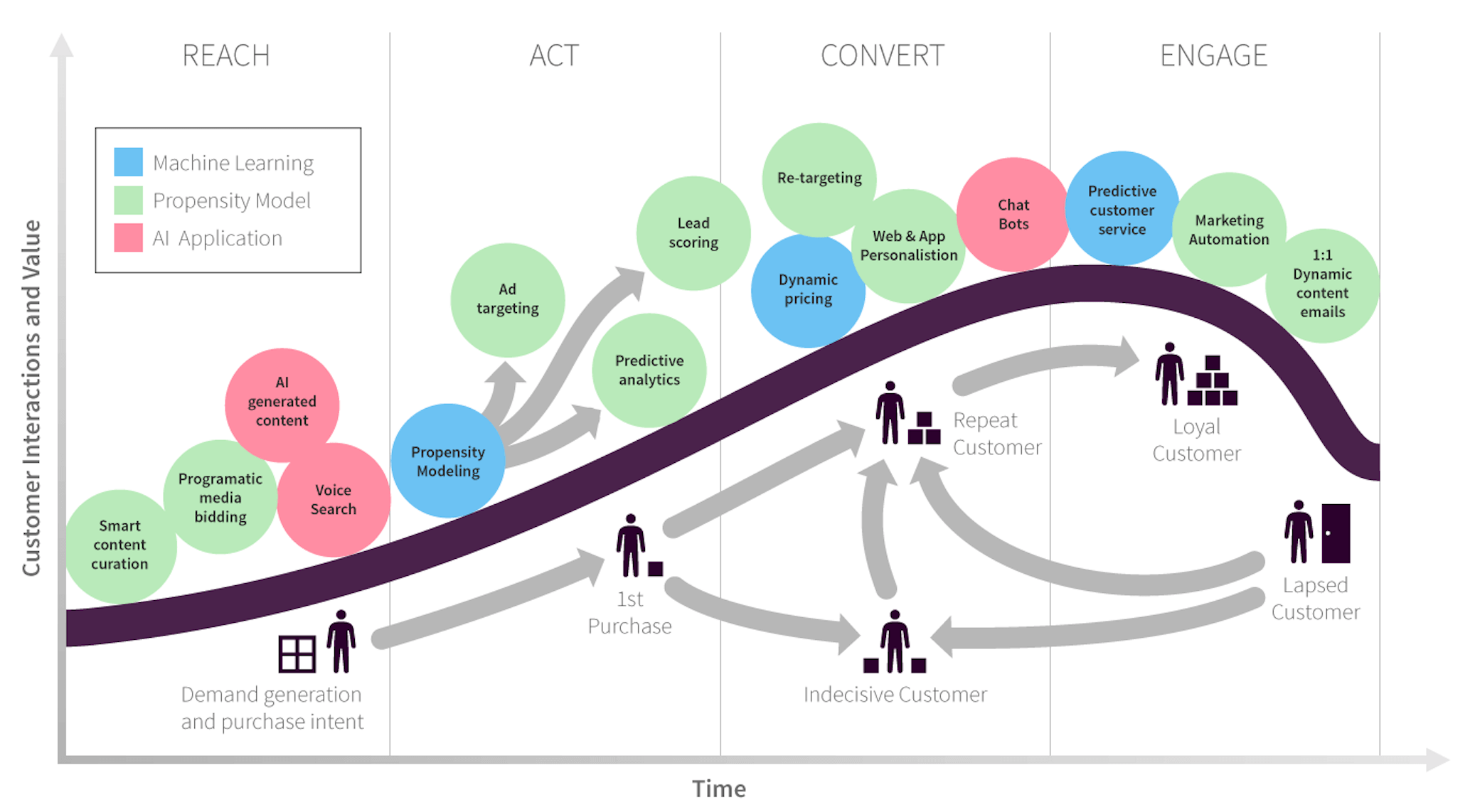
15 marketing applications of Artificial Intelligence (2017)
Since this time, the use of AI in marketing hasn’t become as widespread as might be expected. This is based on research with our members over the last few years. For example, our recent report on marketing automation practices showed that just 13% were using AI and machine learning for marketing at the time of the survey. Close to one-third of respondents (38%) are planning to deploy within 12 months, which shows that many businesses are looking to exploit the benefits of AI.
However, half (49%) of businesses still have no plans to implement AI or machine learning to support their marketing. Sure, some large businesses with resources for business insights teams have developed in-house machine learning tools to improve analysis and targeting of customers, but it’s not a mainstream tool according to our research. Its main adoption has been by advertisers who use Google and Meta’s tools to improve their targeting and and ROI, but who aren’t knowingly applying AI to their businesses.
Still, the initial growth rate shared OpenAI’s co-founder is impressive, so I tried to keep an open mind…
They haven't tweeted any updates, but I'd imagine they're in the tens even hundreds of millions by now. Some are talking about a $30 billion value for OpenAI.
Starting with a simple question
So, onto my test, an obvious test for me to understand and explain how ChatGPT could be used by marketers was to use it to write this article. But first, I thought I’d put it through its paces by asking it about what I’ve been advising about all these years. Here’s how it went…
Signing up is simple and free and gives you access to a conversational interface. I started by asking ‘What is digital marketing?’…

What do you think? It’s a solid response covering the goals and main channels. The language is simple and natural, something that isn’t always the case when Google this. Compare this definition to Wikipedia which is the work of many and potentially out-of-date (ChatGPT source is trained up to 2021, so isn’t bang up-to-date).
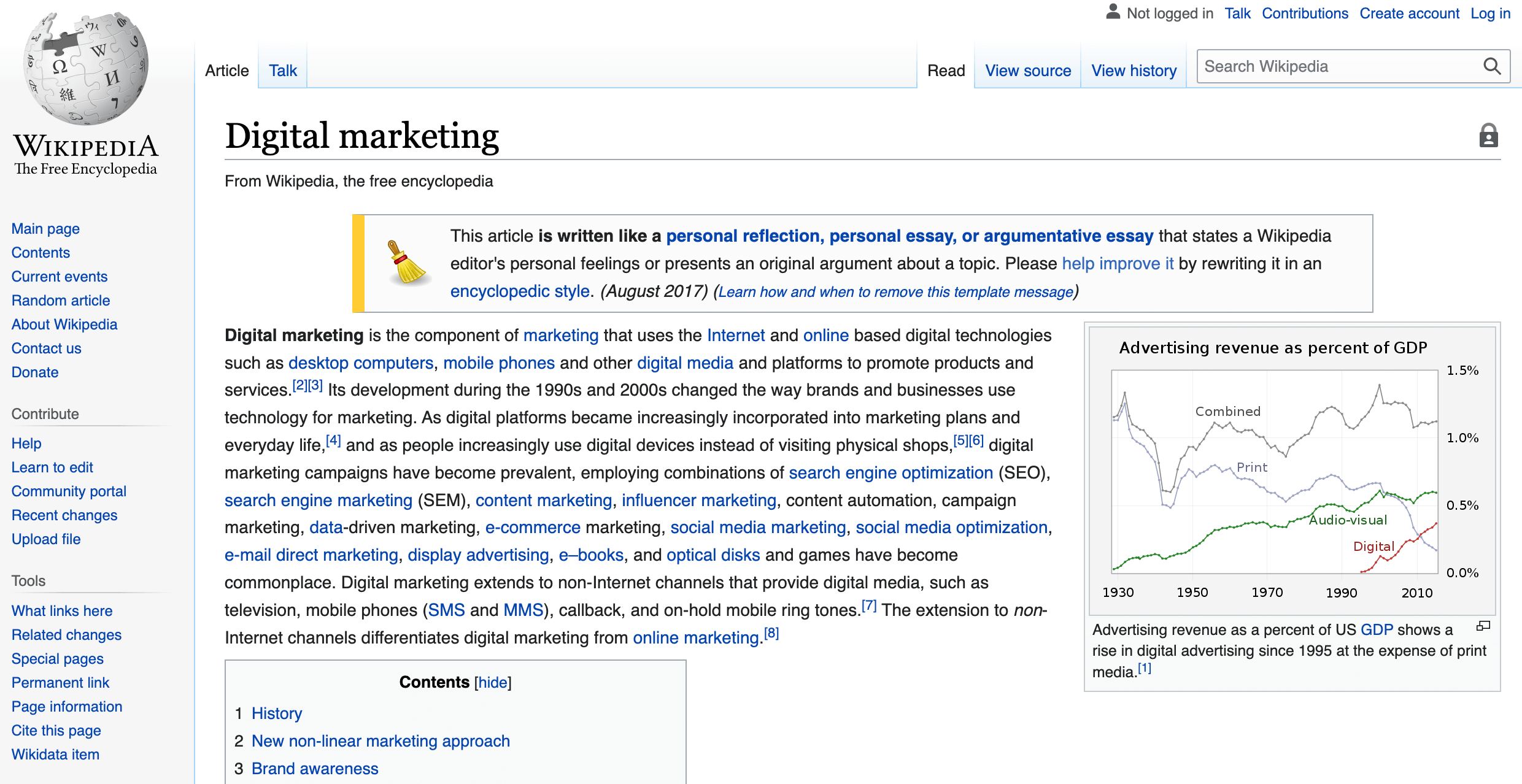
Like many, it treats digital in isolation, rather than looking at integration with physical channels.
Let’s make it more specific...
We’re about helping marketers use a more strategic approach to their digital marketing, so that question was next up…
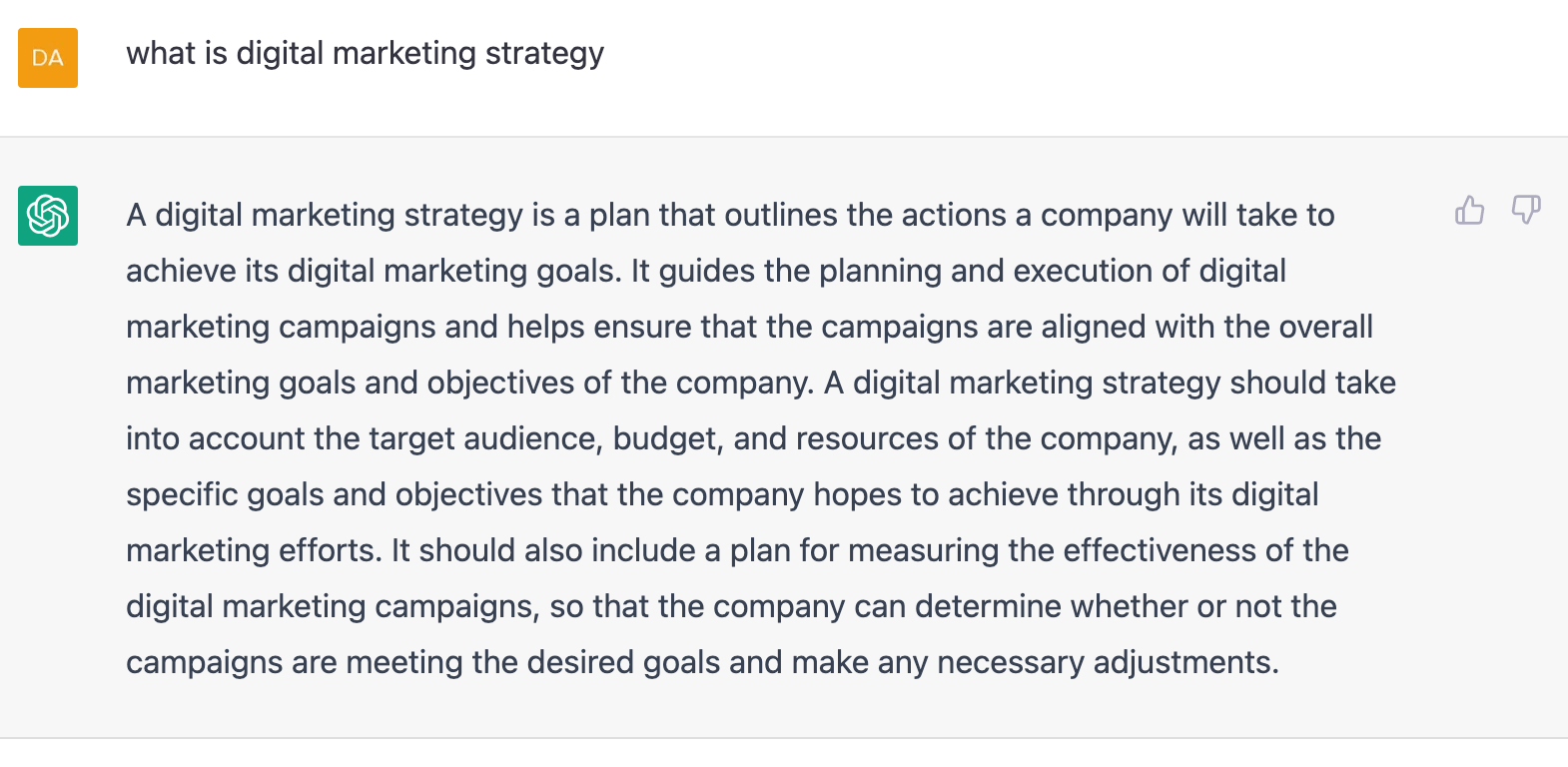
Again, it’s a plausible answer, referencing allocation of resources to meets goals, which could be used to introduce a student assignment on the topic. It’s not perfect though, seemingly confusing overall strategy with digital marketing campaigns and not referencing the importance of investing in always-on or lifecycle communications. The relationship to marketing fundamentals, like segmentation, targeting and brand positioning aren’t covered which is a major omission.
How to structure a digital marketing strategy
OK, let’s make it more practical, many of our members turn to us to help in structuring a digital marketing campaigns and plans. So next I asked ‘how to structure’ a plan…
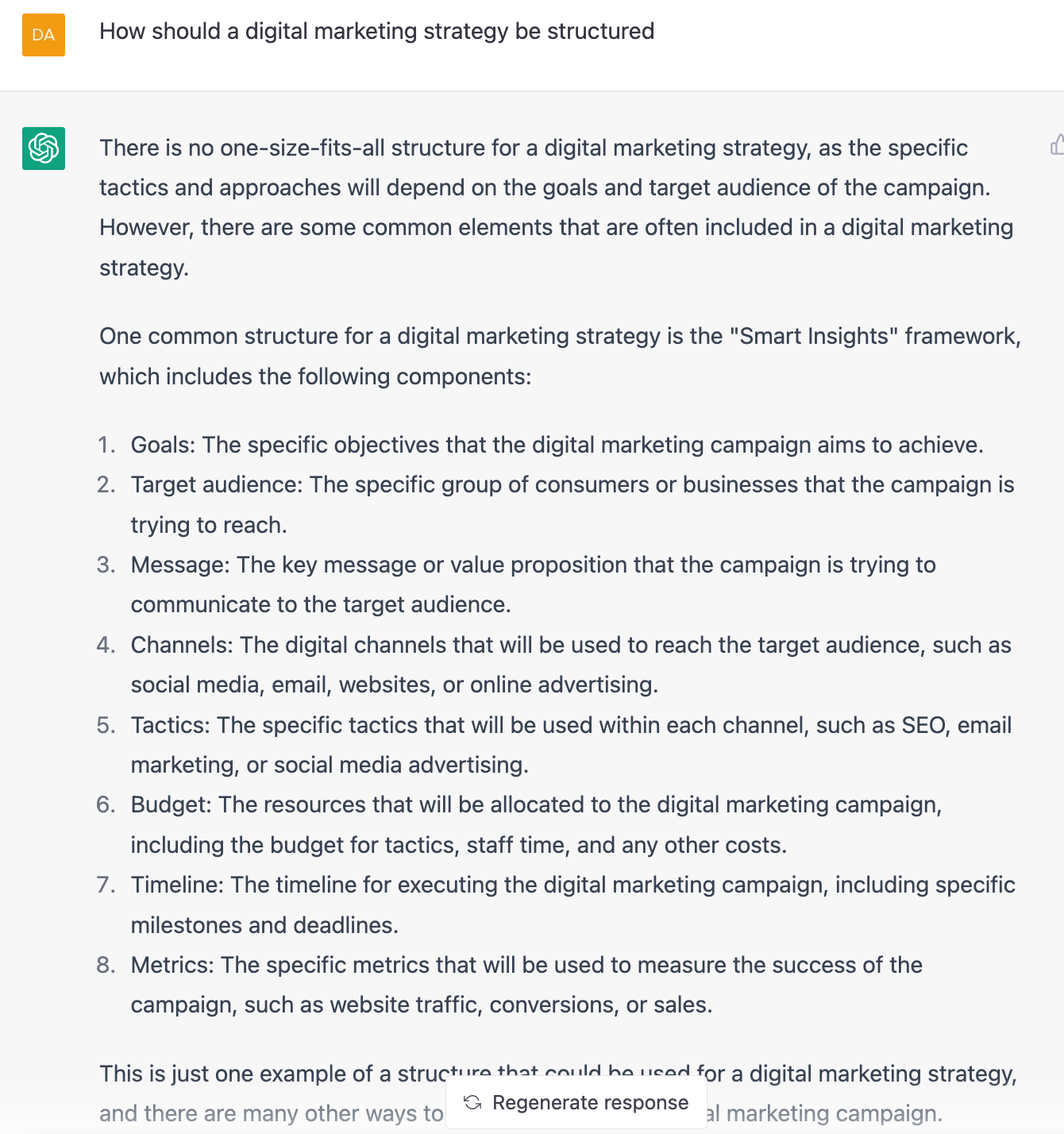
I was surprised and even flattered that the response referenced Smart Insights… One of the weaknesses of AI is that often the source of the reasoning isn’t explained, so this is helpful, but link(s) to sources and reasoning would be more so. This would be an obvious improvement to ChatGPT. Here the structure and the definition given isn’t our standard recommendation using RACE and misses some aspects like marketplace analysis.
Show me an example?
We’ve also found that examples are really useful for explaining how to create digital marketing strategies. We provide many examples for different industries in our templates. How does ChatGPT do here?
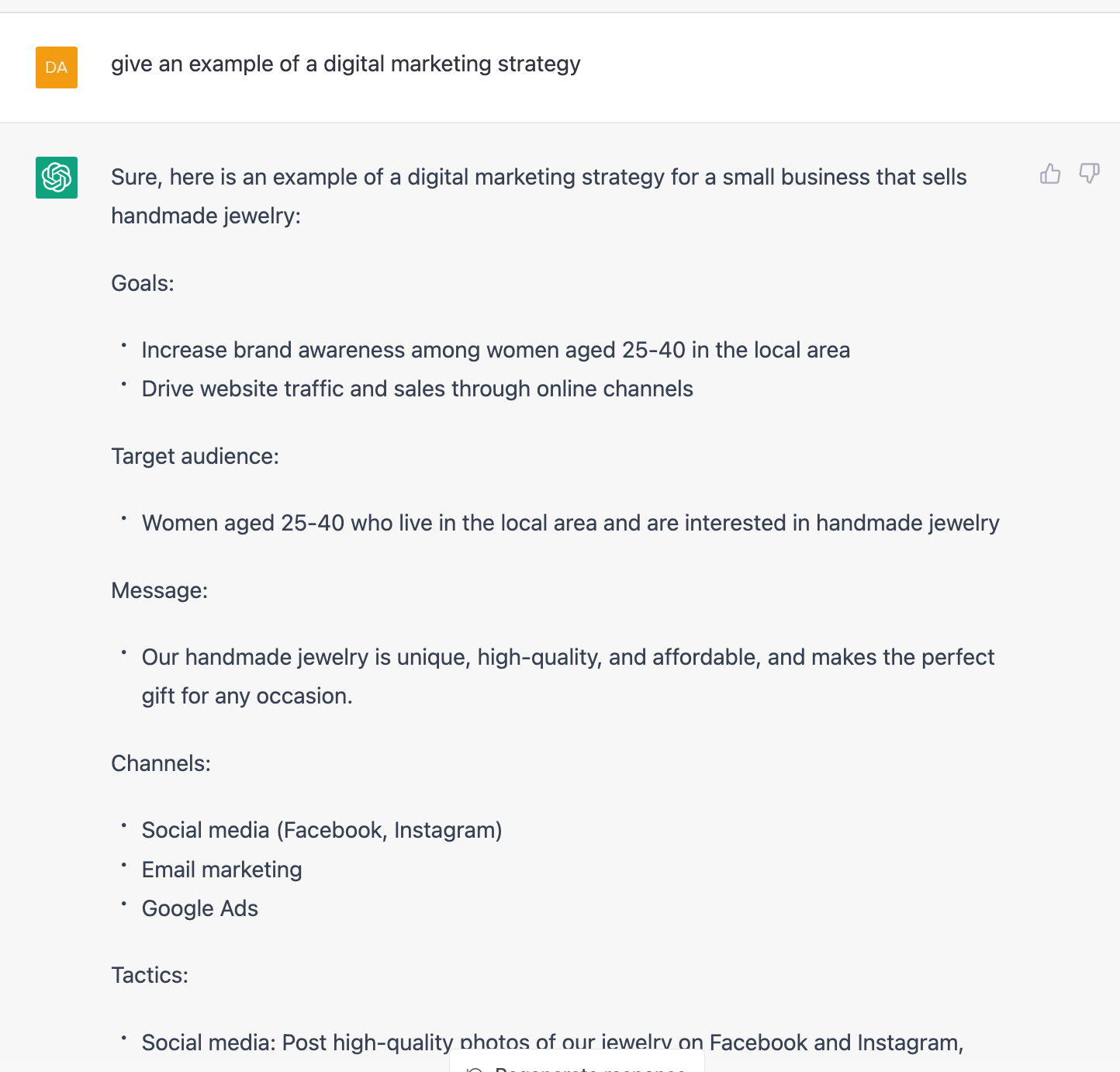
Wow! This is an impressive and useful example, particularly if you’re structuring your own plan, since you can ask for your sector.
Can ChatGPT replicate a discussion between a digital marketing consultant and a client?
This example is for an SME and is reminiscent of a recent conversation that I had with the marketing manager of Upbeat Clean, an ethical office cleaning business based in Derby. So, I decided to continue with an evolution of the conversation which was similar to what I had with the owner of the business. In developing our resources for Smart Insights such as our marketing playbooks and templates, I’ve always looked to follow a model of providing guidance by specifying and prompting the questions marketers should be asking to get more performance from resources available, so I love that this tool can mimic a Q&A approach to improve marketing results, albeit dependent on the quality of the training data.
Like for many, the company I was working with was resource and budget was limited, so I asked the AI how the plan could be modified since budget was limited budget…
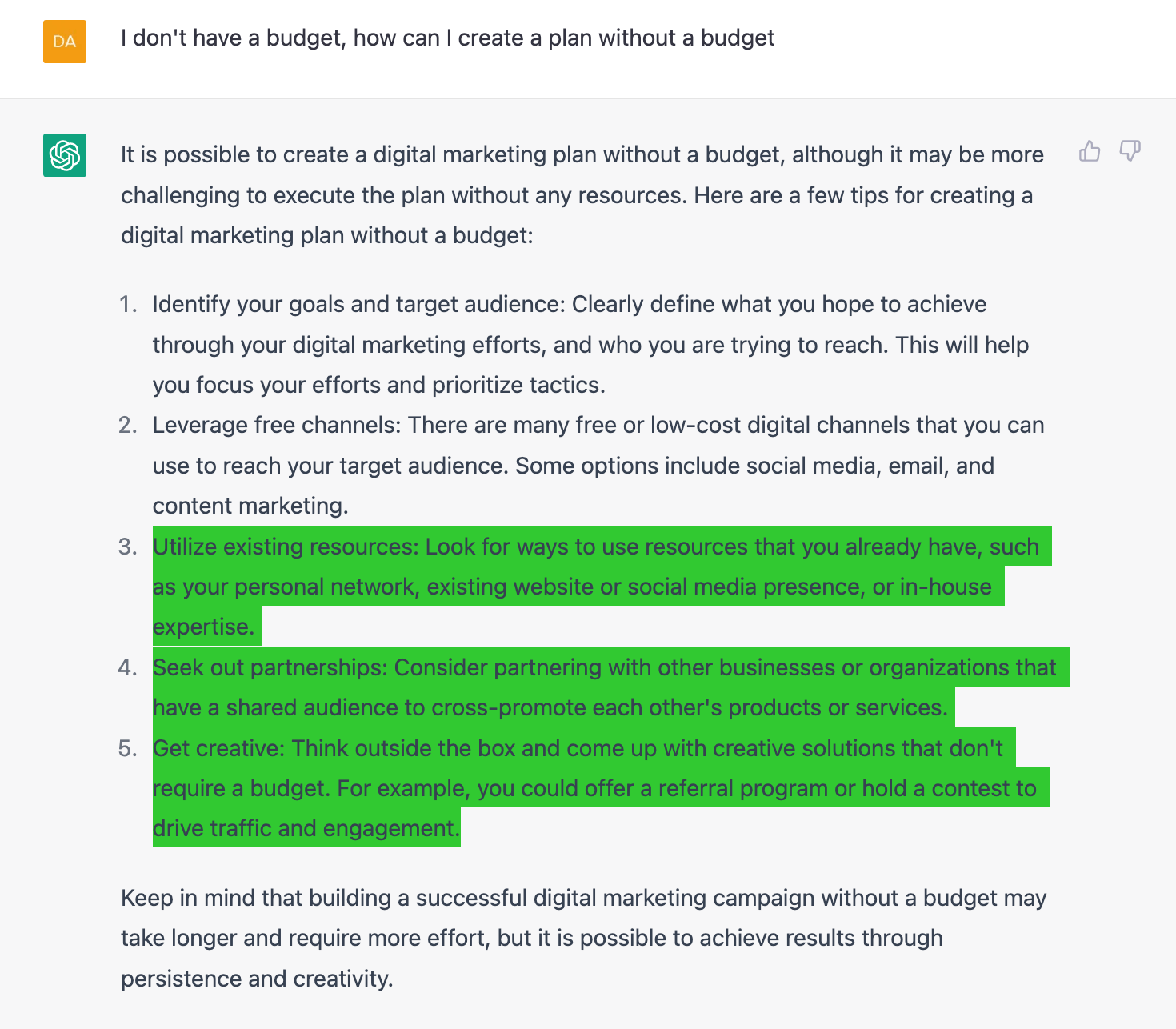
The highlighted advice is similar to what I would give, to ‘double down’ on co-marketing.
For the business in question, local marketing getting featured in Google My Business for people looking for services in a location was particularly useful, so I thought I’d check whether the AI could deduce this.
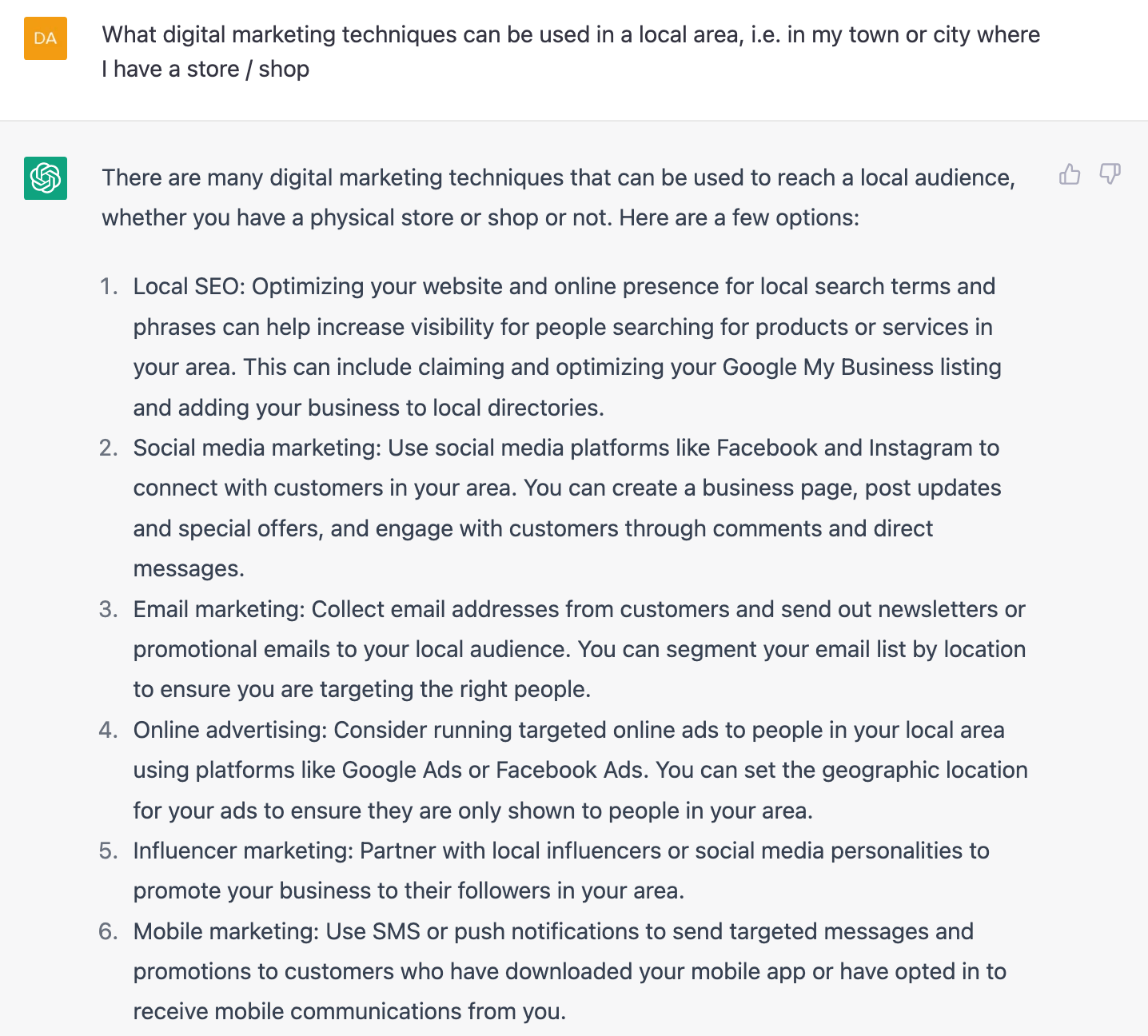
It did… impressive. Local SEO with GMB was top of the list. A tool like this is like having your own personal consultant…
I thought I’d test it further by asking specifically about local SEO…

Again, lots of simple practical suggestions similar to those I recommended to the not-for-profit I was working with (which worked for them to improve rankings). OK, you could find these from a blog post, but you’d have to find a suitable one first.
Of course with a consultant, you’re paying for their experience and knowledge of tools to help too, so finally, I thought I’d ask about tools to support the local marketing process…

Impressive that the tools I would recommend are there, with details on specific local SEO modules. Some links and reviews would be useful.
What are the weaknesses of ChatGPT?
Many have criticized the lack of rigour of the answers from ChatGPT as shown by the Search Journal article I referenced at the beginning. For example,
If you can’t trust the answers, how can you still use the tool? I think the examples I have shown show, that you can still use the service, you simply have to apply your own experience and knowledge in the same way you do when reviewing Google’s results.
Clearly trust is the biggest weakness since unlike Google, you don’t know the source of the information, you can’t judge based on the type of site or the experience of the author. Google’s system of basing quality on the number of citations of an article isn’t in place. Further research is going to be needed and this will take time, so people will still return to trusted sources and expertise.
Google is also superior in providing different types of results for different types of intent, certain results highlight images or video for example. These visual tools are important to learning yet ChatGPT doesn’t incorporate these… yet. Interestingly, Open AI has created DALL·E, an AI to create Images from Text. I’m not sure of the marketing applications of an armchair in the shape of an avocado…

I didn’t follow though on my intention to structure this article using ChatGPT since it didn’t understand the intent in my question. However, it did respond with a nice summary of the typical applications of chatbots. The quality of ChatGPT responses shows there is still potential in all these applications, but many other providers have failed to deliver this level of accuracy based on my many failed interactions with chatbots!

But ultimately, it didn’t create a usable structure for this article.
Despite this, I defy you to sign up and not be impressed by the answers you receive a range of topics related to your personal or work interests.
Certainly, Google are reported to be panicking, it’s understandable. According to the New York Times, The new chatbot is a ‘Code Red’ for Google’s Search business. According to the NYT, Sundar Pichai, Google’s CEO, has been involved in a series of meetings to define Google’s AI strategy, and he has upended the work of numerous groups inside the company to respond to the threat that ChatGPT poses.
In a move competitive to Google, Microsoft has also announced an intention to integrate ChatGPT into Bing by March, it will be interesting to see how this develops.
I think it’s also unlikely to remain free. This is a research preview option only and I think others will pay for it. Still there will be free competitors in the future, but how will we compare them?
What are the implications for marketing?
At a practical level, I think success in digital marketing requires three factors to succeed in communicating with your audience, that is, to provide relevance and value and to change the way they think. I think any marketer who is involved with devising communications for website, social media, or email marketing and then spending copywriting can potentially benefit from ChatGPT by becoming more productive AND producing better quality copy. Not by slavishly using the answers ChatGPT produces, but using it to prompt and improve upon your approach and to iterate on it. This is regardless of their experience and the size and type of company they work in. It’s a great supporting tool to evolve your knowledge, to ‘learning by doing’, aka experiential learning. If you believe in lifelong learning it can support anyone.
It will also be disruptive in that in time it offers an alternative model for learning about topics. We all love Google, and through its efforts to apply AI already, it delivers great relevance, but it can be hard work, we have to sift through multiple links to pages that vary in quality. Every day, my search history shows me I visit hundreds of sites… there has to be a better way and there is massive potential for Google and others to improve relevance further by offering a different model of results delivery. Still, I don’t think Google’s ad revenue model is at immediate threat since Chat GPT doesn’t cover brands, products and services as well as Google and there is no linking model.
The quality of its interaction and output also raises much bigger questions about education and healthcare. It will change the way these and many other services are delivered which has only so far been hinted at by previous attempts at Chatbots.
How can ChatGPT be used for working on marketing activities like search email, social media?
We’re already seeing many examples of how output from ChatGPT can be used to create copy and for keyword analysis. In my next article, I recommend the best prompts for using ChatGPT for digital marketing. I’ll look at lots of examples since having the experience to ask the right questions and use their creativity to create an article is still important thankfully! For now.
The use cases I will cover include:
- Keyword analysis for SEO
- Content marketing ideation
- Copywriting / optimization for organic search and PPC
- Email marketing
- Summarising market research
- Writing product descriptions for E-commerce
How many marketers are using ChatGPT?
Our recent LinkedIn survey found that more than three-quarters of marketers want to use ChatGPT to improve their marketing performance, but only 40% are actively doing so right now.
Sometimes, it can be difficult to know where to start. That's why we've created a Quick Win for Smart Insights Business Members to rapidly review and assess new ChatGPT opportunities.
This guide is for anyone looking to learn more about ChatGPT, but would be particularly useful for marketers executing or managing channel specialisms. E.g., Content marketers, social media marketers, SEO specialists or strategists, etc. to learn how you could use the ChatGPT collaboratively to improve efficiency in your team, in less than 20 minutes.
Access our Quick Win – How to use ChatGPT for marketing
Discover everything you need to know about advanced prompting techniques for ChatGPT in our Quick Win.
Access the How to use ChatGPT for marketing






